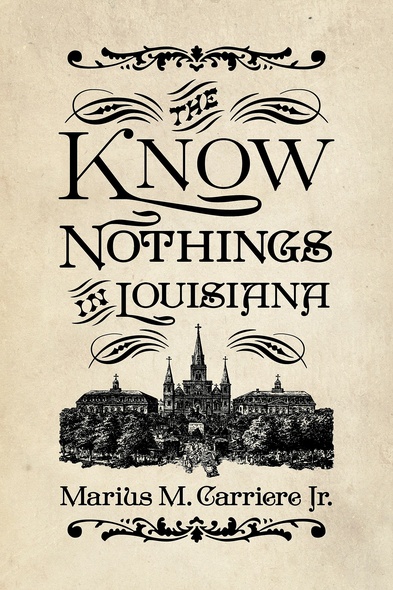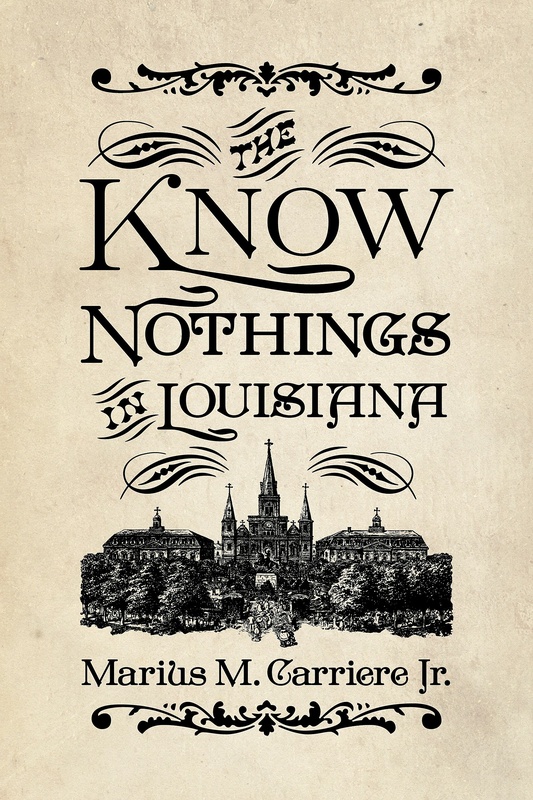
In the 1850s, a startling new political party appeared on the American scene. Both its members and its critics called the new party by various names, but to most it was known as the Know Nothing Party. It reignited political fires over nativism and anti-immigration sentiments. At a time of political uncertainty, with the Whig party on the verge of collapse, the Know Nothings seemed destined to replace them and perhaps become a political fixture.
Historian Marius M. Carriere Jr. tracks the rise and fall of the Know Nothing movement in Louisiana, outlining not only the history of the party as it is usually known, but also explaining how the party’s unique permeation in Louisiana contrasted with the Know Nothings’ expansion nationally and elsewhere in the South. For example, many Roman Catholics in the state joined the Know Nothings, even though the party was nationally known as anti-Catholic.
While historians have largely concentrated on the Know Nothings’ success in the North, Carriere furnishes a new context for the evolution of a national political movement at odds with its Louisiana constituents. Through statistics on various elections and demographics of Louisiana politicians, Carriere forms a detailed account of Louisiana’s Know Nothing Party. The national and rapidly changing Louisiana political landscape yielded surprising, credible leverage for the Know Nothing movement. Slavery, Carriere argues, also played a crucial difference between southern and northern Know Nothing ideals. Carriere delineates the eventual downfall of the Know Nothing Party, while offering new perspectives on a nativist movement, which has appeared once again in a changing, divided country.
The Know Nothings of Louisiana makes an important contribution to historians’ understanding of the influence of nativism in politics in the antebellum United States. This book should appeal not only to those interested in the Know-Nothings and Louisiana politics in particular, but also to anyone concerned with how immigration and reactions to it shaped American politics in the nineteenth century.
Historians have largely shied away from the kind of deep statistical study that Carriere undertakes in his book, but his research clarifies several key points about who joined the Know Nothing movement in Louisiana.
Carriere’s careful statistical research into Know Nothing political leaders and the parishes that supported them allows him to control for a variety of influential factors.
Southern Know Nothings have been curiously neglected in the historical literature, so this study of Louisiana is especially welcome. Marius Carriere has tackled an enormously complex subject in a state whose labyrinthine politics along with a multifaceted and multiethnic culture pose considerable challenges for any scholar. The Know Nothings in Louisiana is well researched and forcefully written. Carriere offers a nuanced and persuasive account of the American Party in Louisiana that focuses on its appeal, brief success, and steady demise. It is an excellent contribution to the study of antebellum southern politics.
No other Deep South states in the 1850s had so powerful a Know Nothing outburst as did Louisiana. Hence Marius Carriere’s solidly researched and deftly analyzed study of the movement there is a most welcome addition to the literature on antebellum politics.
Marius Carriere’s The Know Nothings in Louisiana is local and state history at its very best. Based on extensive research in primary and secondary sources, Carriere’s book offers a thorough and revisionist account of Know Nothingism in an important southern state. He persuasively maintains that Louisiana Know Nothingism was more complex socially and politically than previously thought. Moreover, he places his story in a national context. While acknowledging the number and influence of Roman Catholics and foreign immigrants made Louisiana unique in the South, he insists on the vital interaction between state and national events. Louisiana Know Nothings did not originate, flourish, and ultimately disappear without influences from beyond state borders. I heartily endorse the Carriere achievement.
Marius M. Carriere Jr. is professor of history at Christian Brothers University. In addition to entries in the Tennessee Encyclopedia of History and Culture, he has published essays in edited volumes as well as articles in Journal of Mississippi History, Tennessee Historical Quarterly, and Louisiana History.




